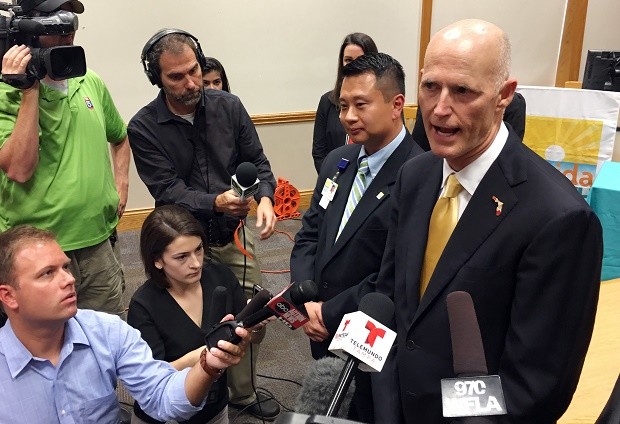Florida: 5 new Zika cases including 1 in the Tampa Bay area

Florida Gov. Rick Scott addresses the media during a round-table discussion about the Zika virus in St. Petersburg, Fla., Monday Aug. 1, 2016. The CDC issued an advisory, Monday, Aug. 1, 2016, that says pregnant women should not travel to the so-called Zika “transmission area” in Florida and pregnant women who live there should take steps to prevent mosquito bites. The advisory comes after 10 new infections of the Zika virus were reported in the same Miami neighborhood likely transmitted by local mosquitoes. AP
PETERSBURG, Florida — Florida Gov. Rick Scott on Tuesday announced a non-travel-related case of Zika in the Tampa Bay region.
It’s the first in the state outside the Miami area, but Scott said there wasn’t enough evidence to date to declare a new zone of local transmission.
If Department of Health officials conclude mosquitoes have transmitted the disease to people in the Tampa Bay area of Pinellas County, it would the third such area in the continental US following clusters of cases traced to downtown Miami’s Wynwood arts district and a touristy area of Miami Beach.
“While this investigation is ongoing, DOH still believes that ongoing active transmissions are only occurring in the two previously identified areas in Wynwood and Miami Beach,” Scott said in a statement.
Scott spoke during a Zika roundtable in the Pinellas County city of Clearwater, near Tampa. He also said four new cases were connected to mosquitoes in Miami’s Wynwood arts district. A fifth new case was diagnosed in a Pinellas County resident who hasn’t traveled internationally.
Article continues after this advertisementOfficials are looking into the possibility that the Pinellas County resident was infected with the virus in a neighboring county. Health officials wouldn’t say where the Pinellas resident lives.
Article continues after this advertisementZika can cause severe brain-related birth defects, including a dangerously small head, if women are infected during pregnancy.
Dr. Charles Lockwood, the dean of the Morsani College of Medicine at the University of South Florida and the senior vice president of USF Health, said that “out of an abundance of caution,” all pregnant women in the Tampa Bay area should use condoms with their partners until health officials determine if certain neighborhoods are affected by Zika.
“Until we can narrow down with great precision the neighborhoods infected, we have to assume every pregnant woman is at risk in Pinellas and Hillsborough until you can say it’s a specific neighborhood,” he said. “I believe that it’s also time for physicians in this area to start testing pregnant women in this area for the virus.”
Tampa Mayor Bob Buckhorn, whose city sits across the bay from Pinellas County, said Tuesday that he isn’t waiting for federal, state or county officials to act.
Buckhorn said he’s authorized city officials to buy 4,000 mosquito “dunks,” or small, doughnut-shaped pellets. Code enforcement officers will comb the city, looking for abandoned or foreclosed homes with pools and drop the dunks into the water. The pellets kill mosquito larvae for up to 30 days.
“We’re aware of the impact Zika could have on restaurants and tourism in the city and the state,” the mayor said. “I’m not going to wait for either Congress to reconvene or any other agency to dictate the health and safety and welfare of my citizens.”
RELATED STORIES
CDC warns pregnant women against Zika-stricken part of Miami